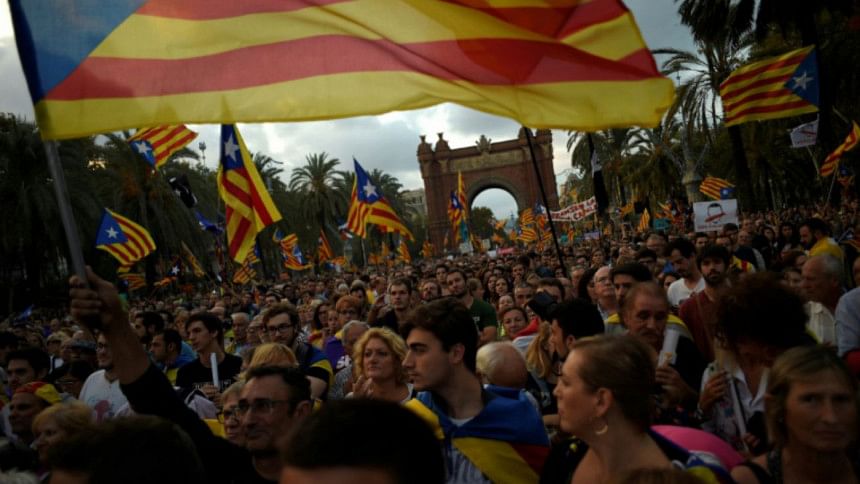Crisis averted for now as Spanish PM has upper hand

The decision of Catalonia's separatist leaders to delay their unilateral declaration of independence from Spain may have averted an immediate showdown between the regional government in the Catalonian capital Barcelona, and Spain's central government in Madrid.
Ultimately, however, this is but a brief lull in a crisis that still seems set to end with the suspension of Catalan autonomy and a grave stand-off that is increasingly worrying all of Spain's European allies.
Faced with the near certainty that his regional administration will be dissolved by orders of the Spanish authorities and that both he and his closest associates may be arrested and charged with sedition, Mr Carles Puigdemont, president of the regional Catalan government, stopped short of declaring independence at an emotionally charged session of parliament on Tuesday. However, Mr Puigdemont coupled that concession with the assertion that, through a controversial referendum held earlier this month, the Catalans have already "won the right to be an independent country".
He glossed over the fact that Spain's Constitutional Court had judged the referendum illegal, turnout was just 42 percent of those entitled to vote and that the exercise lacked any basic safeguards to ensure fair participation or counting.
Nevertheless, Mr Puigdemont asserted that "the ballots say 'yes' to independence and this is the will I want to go forward with".
Separatist legislators also signed a document promising the eventual establishment of an independent Catalan republic; Mr Puigdemont merely asked for "the suspension of the effects of the declaration of independence for a few weeks, to open a period of dialogue".
Yet, calm and time are precisely the commodities the central authorities in Madrid lack.
For although Spanish Prime Minister Mariano Rajoy is undoubtedly relieved that his government will not need to swing into action against Catalonia immediately, he has no intention of entering into dialogue with Catalan separatists, as long as they persist in their demands for independence.
The uncompromisingly anti-separatist attitude of Spain's political class and media leaves Mr Rajoy with very little room for manoeuvre.
Nor is Spain's central government prepared to rule out the option of suspending Catalonia's autonomy and imposing direct rule from Madrid.
"I want to make one thing absolutely clear: as long as the threat of a declaration of independence remains on the political horizon, it's going to be very difficult for the government not to take steps," said the prime minister.
However, Mr Rajoy knows that sticking to a purely legalistic approach is beginning to grate with Spain's EU partners, who, while offering support to Spain, do expect the Spanish government to manage the confrontation peacefully and fear that, if mishandled, a festering Catalonian crisis could paralyse Spain for years to come and be "bad for the rest of Europe", as EU Council President Donald Tusk admitted earlier this week.
Mr Rajoy will, therefore, come under some pressure to win time and find a mechanism for dialogue with Catalan nationalists.
The snag is how to do so without accepting the claim of Catalan separatists that independence is the ultimate goal. Mr Puigdemont clearly hopes that if any dialogue starts, he could get some EU involvement, and that will work in his favour.
Still, the separatists are, for the first time in years, on the defensive. The announcement that two major Spanish banks are considering relocating their headquarters from Barcelona to Madrid has shifted the debate away from the stirring emotional abstractions of independence to the practical costs of separation.
Clear indications from the EU that should Catalonia get independence, it cannot expect to either be admitted immediately into the EU or keep the euro as its currency, have also reminded Catalan separatists that they may end up paying dearly for their adventure.
And those advocating the maintenance of Spain's unity are also mobilising in Catalonia. A pro-unity demonstration organised by the Societat Civil Catalana, a local non-governmental organisation, attracted hundreds of thousands of Catalans opposed to secession, a useful show of support for the central government.
Meanwhile, Mr Puigdemont, who has no majority in the Catalan Parliament, is coming under attack from a far-left small political movement on whose support he depends, and which wants him to move much faster on independence.
Mr Rajoy has regained, therefore, the upper hand in this crisis. But only up to a point, for all the fateful choices about the future of Spain still lie ahead of him.
Jonathan Eyal is the Europe Correspondent for The Straits Times.
Copyright: Asia News Network/The Straits Times










Comments